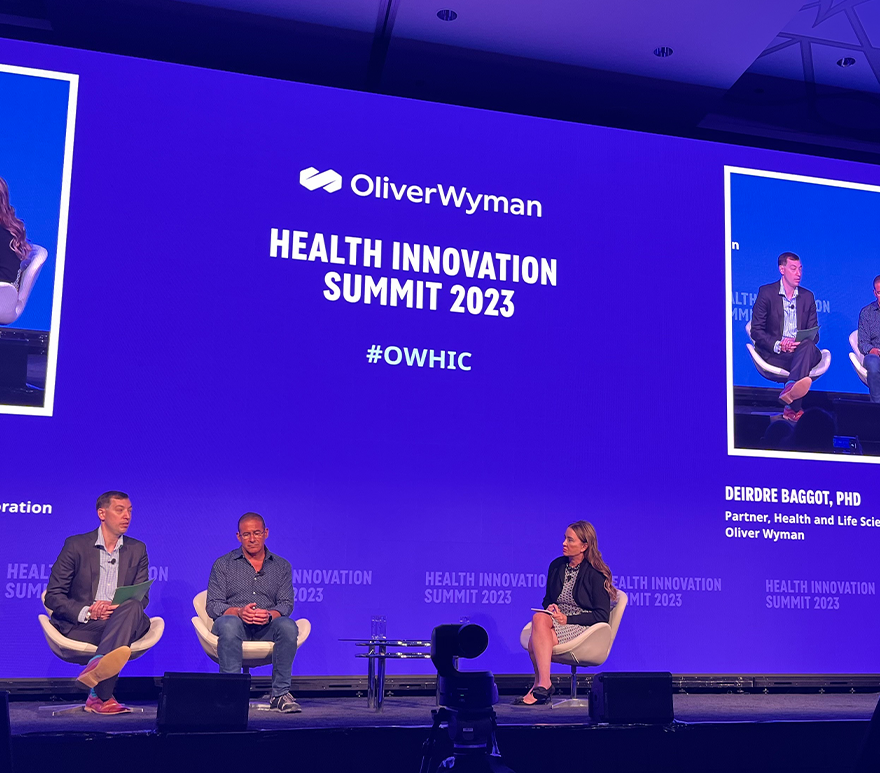Healthcare leaders don’t have any more excuses for failing to spur change and give consumers not just the healthcare they want, but the healthcare they deserve, Oliver Wyman’s Sam Glick boldly stated during the last day of the Oliver Wyman Health Innovation Summit.
“We know what matters. We know why we are here,” he said. “We know we have an obligation to make healthcare more accessible, more affordable … and something that adds value to people’s lives.”
Speakers from entrenched players, start-ups, private capital, and big tech articulated a vision that borrows ideas from other industries, rides the momentum of breakthrough ideas, and, above all else, puts the consumer front and center.
“It’s not about disrupting. It is about impact,” Tanvi Patel, Director of Amazon Pharmacy, said during a conversation with Yahoo! Finance’s Anjalee Khemlani.
While incumbents may fret over Amazon deepening its reach into healthcare, Patel said the company is no different from any other organization that is trying to transform the industry. Where Amazon is different, she said, is in its ability to remove friction points. Amazon is constantly listening to customers and adapting its services to make life easier for consumers. Home delivery of medication is an obvious example. But she also pointed out the company has worked with drug manufacturers to automate a system for applying coupons to prescription orders, rather than forcing patients, physicians, and pharmacists to scrounge around for them. Amazon wants to expand these types of collaborations and partnerships across the industry to eliminate roadblocks for consumers, Patel added.
Making mental healthcare accessible
Removing friction points is exactly what Gabe Diop is doing to improve access to mental health and substance abuse disorder services. He is the Co-founder of Path Mental Health. Improving access to mental healthcare is personal for Diop, whose uncle died from a heroin overdose.
“We are a healthcare provider group enabled by technology. I picked those words very carefully and that order of words very carefully,” he said.
One of the biggest hurdles that Path addresses is linking patients with a provider who takes insurance. Studies have found that fewer than 50% of psychiatrists take insurance and among those that do, many only accept one or two types. But Path doesn’t just remove that friction point. It also connects patients with specialists who meet their personalized needs, including racial and ethnic considerations. Path typically connects patients with a provider within three days.
Diop said Path is borrowing a page from the Amazons and Ubers of the world and making care more efficient, regardless of the type of insurance a patient has.
Doctors as agents of change
“Don’t think of me as a disrupter, think of me as someone who wants to help your systems evolve and improve care for patients,” Marc Harrison, MD, said.
For much of his career, Harrison was viewed as a disrupter for within the industry, especially during his time leading Intermountain Healthcare where he advanced value-based care designs, extended reach into rural communities, and more. Harrison now wears a different hat as Co-founder and CEO of the Health Assurance Transformation Corp., which is backed by General Catalyst.
Harrison said that private capital, which is often criticized for prioritizing profit over quality, needs to take a different approach in healthcare. Since healthcare changes over long periods of time, the industry needs longer-term investments and permanent capital vehicles.
He also called for physicians to be more involved in spurring innovation and transformation. Jesse Ehrenfeld, MD, President of the American Medical Association, reinforced that sentiment.
“We see innovation being disconnected from our care teams. We see technologies over and over where physician input is an afterthought,” he said, adding that physicians are excited about innovation. One in five physicians uses artificial intelligence, he pointed out. While most of that is currently associated with back-office functions, it helps relieve administration burden and excites them about future uses of AI.
Austin Chiang, MD, is one doctor who is setting change in motion, thousands of followers at a time. Dubbed the TikTok Doc by a number of media outlets, Chiang has nearly 750,000 followers across his social media platforms — TikTok, YouTube, Instgram, and X. On top of his social media presence, he serves as Chief Medical Officer of Medtronic’s gastrointestinal business and Chief Medical Social Media Officer at Jefferson Health.
He uses his status as a social media influencer to counter misinformation and provide consumers, as well as clinicians, with accessible and accurate information about healthcare issues. Hearing from followers who say his posts helped improve their health or provided insights to assist a loved one is tremendous feedback, he said. He urged organizations to create financial incentives to build out physician-led social media platforms and for social media to be added to training programs.
Solving the leadership crisis
Focusing on doing what matters for members is what drives Sachin Jain, MD, CEO of SCAN Group and SCAN Health Plan. Like Patel and Diop, he said healthcare leaders must do a better job of listening to customers and adapting.
SCAN is doing that in a variety of ways. The company in 2022 launched a Medicare Advantage Plan for the LGBTQ+ population. Jain said they expect to have nearly 1,000 members signed up by the end of the year. The insurer is also introduced a new tier in its drug benefit, allowing members to access new therapeutics with an $11 copay.
Even as he highlighted SCAN’s innovations, he cautioned against embracing “toxic positivity” and urged leaders to be more self-critical.
“We do this thing in healthcare where we plant a vegetable garden and we tell the world that we’ve solved hunger,” he argued.
An important question he asks his staff daily is, “If we disappear, will it matter?”
Additional coverage of the Oliver Wyman Health Innovation Summit: Federal Trade Commission Chair Lina Khan discusses market consolidation. Industry leaders lay out a roadmap for the next decade.
